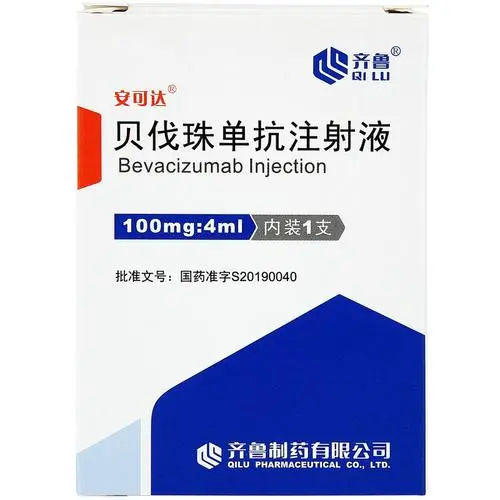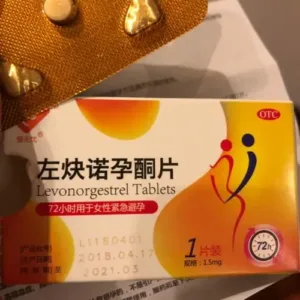Bevacizumab Injection
Function and indication:
1. This product is suitable for metastatic colorectal cancer: Bevacizumab combined with 5-fluorouracil-based chemotherapy is suitable for the treatment of patients with metastatic colorectal cancer. 2. Advanced, metastatic or recurrent non-small cell lung cancer: Bevacizumab combined with carboplatin and paclitaxel is used for the first-line treatment of patients with unresectable advanced, metastatic or recurrent non-squamous non-small cell lung cancer.
Usage and Dosage:
1. General: (1) Bevacizumab should be diluted by professional health personnel using aseptic techniques before infusion. Bevacizumab is administered by intravenous infusion, and the first intravenous infusion time should last for 90 minutes. If the first infusion is well tolerated, the second infusion time can be shortened to 60 minutes. If the patient also has good tolerance for the 60-minute infusion, all subsequent infusions can be completed in 30 minutes. (2) It is recommended to continue bevacizumab treatment until disease progression or intolerable toxicity occurs. 2. Metastatic colorectal cancer (mCRC): The recommended dose of bevacizumab for intravenous infusion is: 5 mg/kg body weight, once every two weeks when combined with m-IFL (modified IFL) chemotherapy. 3. Advanced, metastatic or recurrent non-small cell lung cancer (NSCLC): (1) Bevacizumab is used in combination with carboplatin and paclitaxel for up to 6 cycles, followed by bevacizumab monotherapy until disease progression or unacceptable toxicity. (2) The recommended dose of bevacizumab is 15 mg/kg body weight, once every 3 weeks (15 mg/kg). 4. Special Dosage Instructions (1) Children and Adolescents: The safety and efficacy of bevacizumab in children and adolescents are not yet clear. (2) Elderly: No dose adjustment is required when used in the elderly. (3) Renal Insufficiency: The safety and efficacy of bevacizumab in patients with renal insufficiency have not been studied. (4) Hepatic impairment: The safety and efficacy of bevacizumab in patients with hepatic impairment have not been studied. 5. Special instructions for use, handling and disposal (1) Bevacizumab infusion should not be administered simultaneously or mixed with dextrose or glucose solutions. (2) Do not use intravenous push or rapid injection. Bevacizumab should be prepared by professional health personnel using aseptic techniques. Draw the required amount of bevacizumab and dilute it with 0.9% sodium chloride solution to the required administration volume. The final concentration of bevacizumab solution should be maintained between 1.4-16.5mg/ml. (3) Because the product does not contain a preservative, all remaining drug in the vial should be discarded. As an injectable drug, it should be visually inspected for particulate matter and discoloration before administration. 6. Incompatibility: No incompatibility between bevacizumab and polyvinyl chloride and polyolefin bags has been observed. Concentration-dependent degradation of bevacizumab was observed when diluted with dextrose solution (5%). 7. Disposal of unused/expired drugs: Try to avoid releasing drugs into the environment. Drugs should not be disposed of via wastewater treatment and should be avoided as household waste. If local conditions permit, use an established collection system for disposal. 8. Dose adjustment: It is not recommended to reduce the dose of bevacizumab. Discontinue bevacizumab in the following situations: (1) Gastrointestinal perforation (gastrointestinal perforation, gastrointestinal fistula formation, abdominal abscess), visceral fistula formation. (2) Wound dehiscence requiring intervention and wound healing complications. (3) Severe bleeding (e.g., requiring intervention). (4) Severe arterial thrombotic events. (5) Life-threatening (grade 4) venous thromboembolic events, including pulmonary embolism. (6) Hypertensive crisis or hypertensive encephalopathy. (7) Posterior reversible encephalopathy syndrome (PRES). (8) Nephrotic syndrome. Bevacizumab should be suspended in the following situations: (1) At least 4 weeks before elective surgery. (2) Severe hypertension that is not well controlled by medication. (3) Moderate to severe proteinuria requires further evaluation. (4) Severe infusion reactions.
Adverse reactions:
1. Adverse reactions in clinical trials (1) Several clinical trials have been conducted for the treatment of different malignancies with bevacizumab, most of which were used in combination with chemotherapy. This section describes the safety results obtained from the clinical trial population of approximately 5,500 patients. The most serious adverse drug reactions are: gastrointestinal perforation; bleeding, including pulmonary hemorrhage/hemoptysis, which is more common in patients with NSCLC (non-small cell lung cancer); and arterial thromboembolism. (2) The results of the analysis of clinical safety data suggest that the occurrence of hypertension and proteinuria during bevacizumab treatment may be dose-dependent. (3) The most frequent adverse drug reactions in patients treated with bevacizumab in various clinical trials include hypertension, fatigue or weakness, diarrhea, and abdominal pain. 2. More information on certain serious adverse reactions: The following adverse drug reactions reported using the NCI-CTC Toxicity Evaluation Criteria (Common Toxicity Evaluation Criteria) have been observed in patients receiving bevacizumab. (1) Gastrointestinal perforation and fistula. (2) Non-gastrointestinal fistula. (3) Bleeding. (4) Hypertension. (5) Reversible posterior encephalopathy syndrome. (6) Thromboembolism. (7) Congestive heart failure. (8) Wound healing. (9) Proteinuria. (10) Hypersensitivity reactions, infusion reactions. (11) Ovarian failure/fertility. (12) Infection. 3. Elderly patients: (1) In randomized clinical trials, patients aged ≥65 years may have a greater risk of arterial thromboembolic events such as cerebrovascular accidents, transient ischemic attacks, and myocardial infarction when treated with bevacizumab than those aged <65 years. Other adverse reactions observed at a higher incidence in patients over 65 years include grade 3-4 leukopenia and thrombocytopenia, as well as neutropenia of all grades, diarrhea, nausea, headache, and fatigue. (2) In a clinical trial of metastatic colorectal cancer (study AVF2107), the incidence of other adverse reactions including gastrointestinal perforation, wound healing complications, congestive heart failure and bleeding in elderly patients (>65 years old) treated with bevacizumab was not higher than that in patients aged <65 years treated with bevacizumab. 4. Pediatric patients: This product is not approved for use in people under 18 years old. In published reports, people under 18 years old exposed to this product have experienced bone necrosis in other parts of the body except for osteonecrosis of the jaw. 5. Laboratory abnormalities: (1) Bevacizumab treatment may lead to decreased neutrophil counts, decreased white blood cell counts, and proteinuria. (2) The results of various clinical trials show that compared with those in the control group, the incidence of the following grade 3 and 4 laboratory abnormalities in patients treated with bevacizumab is increased (>2%): increased blood sugar, decreased hemoglobin, decreased blood potassium, decreased blood sodium, decreased white blood cell count, prolonged PT (clotting time), increased normalized ratio, etc. (3) Clinical trials have shown that a transient increase in serum creatinine (1.5-1.9 times baseline level) with or without proteinuria is associated with the use of this product. The increase in serum creatinine is not associated with a high incidence of clinical features of renal injury in patients using this product. 6. Immunogenicity: (1) Like all therapeutic proteins, this product also has potential immunogenicity. (2) In a clinical trial for adjuvant treatment of colon cancer, 14 patients (0.63%) were found to have positive results for treatment-induced anti-bevacizumab antibodies using chemiluminescence detection (ECL) among 2,233 evaluable patients. Among these 14 patients, 3 patients were found to have positive results for anti-bevacizumab neutralizing antibodies using enzyme-linked immunosorbent assay (ELISA). The clinical significance of these anti-bevacizumab antibodies is unknown. (3) The results of immunogenicity tests are highly correlated with the sensitivity and specificity of the test method, and may be affected by the following factors: blood sample processing, sampling time, concomitant medications, and concomitant diseases. For the reasons stated above, comparison of the incidence of anti-bevacizumab antibodies with the incidence of antibodies against other drugs may be misleading. See the drug instructions for details.
Contraindications:
Bevacizumab is contraindicated in patients with known allergies to the following substances: 1. Any component of the drug. 2. Chinese hamster ovary cell products or other recombinant human or humanized antibodies.
Share:
Products
Our offers
Health Classification
Let us work together to protect precious health



























